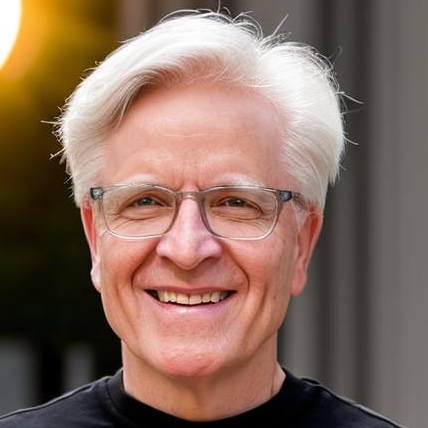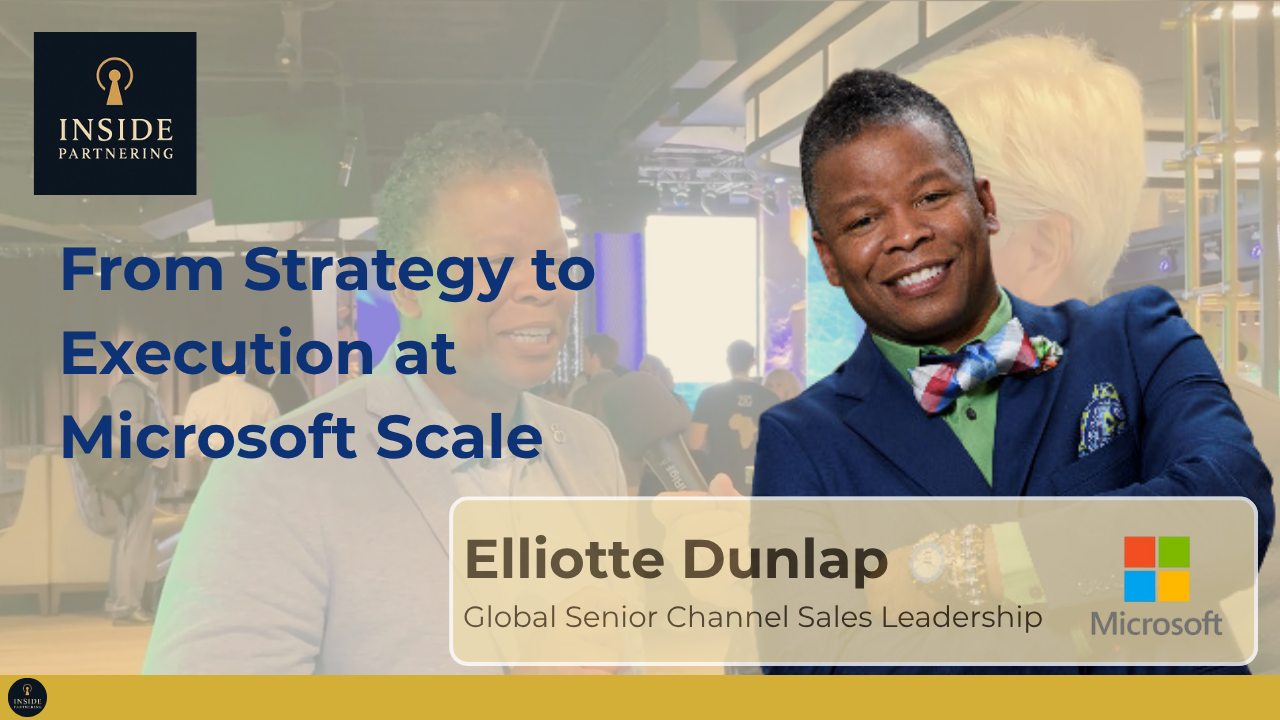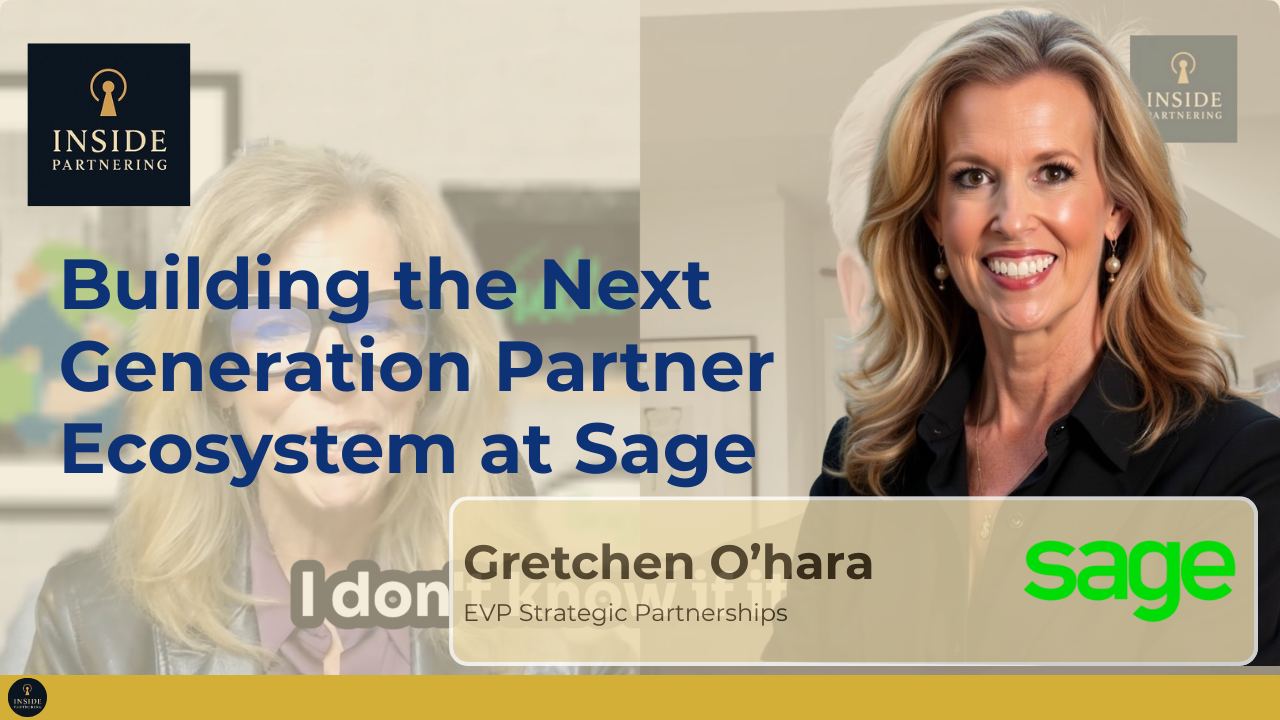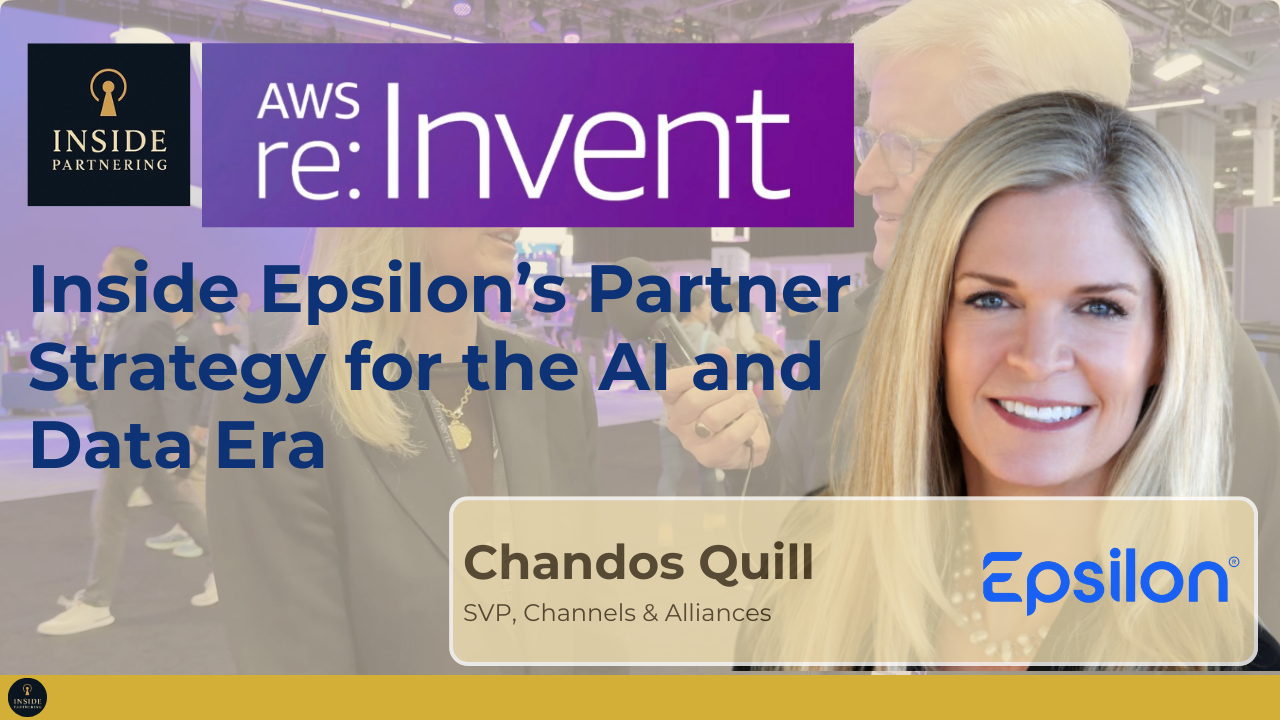Episode Overview
“Keep the main thing, the main thing.”
Had an incredible conversation at Ultimate Partner Live in Dallas with Elliot Dunlap, Global Senior Partner Sales in Data & AI at Microsoft. 🔥
Elliot’s role spans the globe—helping partners go from strategy to execution with clarity, impact, and results.
In our fireside chat, Elliot shared powerful, practical advice for ISVs and partners co-selling with Microsoft, starting with this:
Keep it simple. Stay focused. Execute.
Here are a few gems from our conversation:
✅ Shorten your pitch – Your elevator pitch should be 15 minutes max, not 30. Get to the point and clearly articulate your ask.
✅ Use Partner Center – Stop emailing for AE contacts. Put your opportunities into Partner Center. MSIM aligns with sales stages and creates a timestamp so you show up in the seller’s dashboard.
✅ Align your sales motion with MSIM – Whether your motion is joint, parallel, or compete, speak Microsoft’s language. If you’re not using MSIM, you’re at a disadvantage.
✅ Set the next meeting before you hang up – Two minutes of discipline creates momentum and accountability.
Elliot’s mindset is crystal clear: Microsoft needs partners. The key is to show up prepared, with clarity of purpose and action.
“MSIM isn’t just a framework—it’s the way we get things done.”
Elliot also emphasized that aligning on sales process isn’t just internal ops—it’s the bridge to co-selling effectively and consistently.
Thanks again, Elliot, for bringing clarity, structure, and inspiration to the partner ecosystem. You’re not just talking about partner success—you’re making it happen.
🎧 Full episode coming soon on Inside Partnerships.
#UltimatePartner #MicrosoftEcosystem #MSIM #PartnerSales #GoToMarket #InsidePartnerships #CoSell #EcosystemLeadership #B2BSaaS #CloudPartners
Podcast
Guest

Elliotte Dunlap
Competencies in Monetizing Relationships & #IntentionalExcellence; Thought Leader -> Channel Leadership & Sales, Business Development
Episode Transcript
Chip Rodgers 0:00
Yeah, hey everyone. Chip Rodgers, Chief partner officer at work, span, and we're here at day two in Dallas. And another amazing, yeah, ultimate partner event here. It's been fantastic. Elliot, right? Absolutely.
Speaker 1 0:13
It's, It's good seeing people, faces and places and through the years, and then, you know, the creating an environment where Vin is creative for the ultimate partner, and it's, it's a good thing, good thing. Yeah,
Chip Rodgers 0:26
Vince has done a great job on the event this year, and we were here last year as well in Dallas. And yeah,
Unknown Speaker 0:33
no singing, but
Chip Rodgers 0:37
so excited to be joined today by Elliot Dunlap. And Elliot is global senior partner sales in the data and AI space for Microsoft, and just making an impact worldwide. Now, yes,
Speaker 1 0:53
global, yes, yes, indeed.
Chip Rodgers 0:56
So just, you just had a session that was terrific, really talking about, first of all, I love to hear about, sort of your role and everything, but you talked a lot about CO sell and MSIM and all these really important things for ISVs, and anyone who wants to partner in CO sell with Microsoft. Before I ask that question, tell me about your role. Yeah,
Speaker 1 1:20
absolutely. I mean, the role is complicated, but yet simple. Here's the reality of it. I consider myself a go to market expert. We have global partners that I'm responsible for a set of those, and I'm responsible for pushing execution from a 10,000 foot level down to a one foot level, meaning taking the thought to execution and creating that impact. So I work particularly with the solution the data, and I solution resources within that partner to think of the place to understand the incentives that are going on, then build the road map and the trajectory of how we're going to execute that, whether it be going the partner going to do things by themselves, or igniting the Microsoft sellers to go drive business at a customer?
Chip Rodgers 2:08
Yeah, that's fantastic. So I think you had so many good words of wisdom and great advice in the session it went for, I think it was an hour long session, the four of you up on stage, but there were a lot of questions. Like, if people are really, you know, have so many questions. And so I think, you know, maybe let's start there. Just, what are some of the sort of key things for partners as an ISV partner, or even resellers, like, how do you engage with Microsoft? What are some good tips you just shared them, but maybe you could read,
Speaker 1 2:41
right? I mean, here's the thing, I think keep the main thing, the main thing, a lot of partners come with a lot of data. They come with a lot of stuff. Their elevator pitch is very lengthy. I mean, I'm I enrolled in the methodology. I keep it simple. So the first thing I would say is, and we talked about this is really shortening your meetings from 30 minutes to 15 minutes. Net. Net out what you exactly want from the Microsoft seller or what you want to do. The other thing is, create some bullet points that you just keep on your desk, that every meeting you get to, you could just drop in the window. That way, you don't spend 510, minutes explaining what you do as a partner. But you know the reality of it is, is we can't win without partners, and we really need partners extending our reach to the customers. That means walking indoors, knocking on, knocking on doors, walking in on people, reaching out to resources. One of our peers on the stage, Carson, talked about LinkedIn being that extension to get into opportunity, identification and then ideation, then creation, right? And then manifestation. Man, I sound like I. That just came to me. But at any rate, we want to make it we want partners to feel the need to go visit customers and not provide barriers. We want to be extra when it comes to that, and we want to want to provide the support.
Chip Rodgers 4:12
Yeah, yeah. And I think you also mentioned, you know, partner center, right? Like, you gotta, like, put your deals in there, because that's where that's you told a story about, just now, about used to work with partners, and they'd send you an email and say, Send me the who are the salespeople on all these accounts? You're like, just put it in partners. Yeah.
Speaker 1 4:32
I mean, those days are old and done. I mean, if you're a partner and you got opportunity, that's why we created msim. Sales stages one, sales, stages two, sales stage three, sales stage four, sales stage five. The beauty of sales stage one is listen and consult. So if you have an opportunity and you have a hunch or you've gotten some feedback, understanding that definition of listen and consult, put it in a partner center, and partner center will spit back. Tech, the AE, or the resource needed for that account, but it, but the most important thing is it creates a timestamp, an identifier for you, in that sales sellers, MSX in their dashboard, where they say, Who's that partner right there? And they just created opportunity. Hey, I've been trying to call that customer. Let me contact them, or you send the email they're likely to pick up and want to get back with you. Yeah.
Chip Rodgers 5:30
I mean, you know, the the the motivations are aligned, right? The goals are aligned. So with with between Microsoft and partners, everybody wants, you know, the customer to win and and, you know, ultimately driving ACR, right? But it's, it's about, you know, putting these joint solutions together and making sure that customers get value from it.
Speaker 1 5:53
No, I mean, you have to align. And I think that's what MSIM did, was, I would advise, if you're a partner out there and you don't have a selling methodology, go ahead and invest in MSIM if you do, make sure that your selling methodology lines up to our selling methodology, because that is the language. Last year, I spent a lot of time at ultimate partner and was on stage talking about the education of MSIM and the listening and the understanding and having the definitions. You know, what is the rooms of the house? What does what is the definition of sales? Stage three this year, as you saw on stage, we talked about MSIM as an application. What things turn it into an action? Right understanding, what type of partnering you're doing. Is it joint? Partnering? Is it parallel? Partnering? Is it compete? Partnering, having those things in place, and then also understanding, hey, something as simple as setting the meeting the next meeting before you get off that call save so much time. Yeah, carve out two minutes. Put you a timer on there and say, Hey, let's take a pause for a second. Let's set the meeting in 10 days. Look, yeah, let's look at calendars and let's create this impending action that whatever we discuss, we're going to make it happen. Yeah,
Chip Rodgers 7:18
I love that. That's so you're right. It is. It's simple, it's simple, but it's but it's really
Speaker 1 7:23
powerful. Amazing. How many partners have meetings, get off the phone, and it takes them four Wait. What's next?
Chip Rodgers 7:33
Well, that's great. Elliot, thank you so much for sharing your thoughts. Just now, we got a little little photo bomb there. So yeah, thanks for sharing your your your thoughts and and wisdom, and both on stage and just now. So
Unknown Speaker 7:55
any questions, let me know. Appreciate you. All right, very
Chip Rodgers 7:57
good. And thank you all for joining as well, and we'll see you next time. Thanks, everybody. All right.

Chip Rodgers
🚀 CMO | Chief Partner Officer | B2B SaaS Growth & GTM Leader | Ecosystem Strategy | Demand Gen | Podcast Host 🎙


.png)

